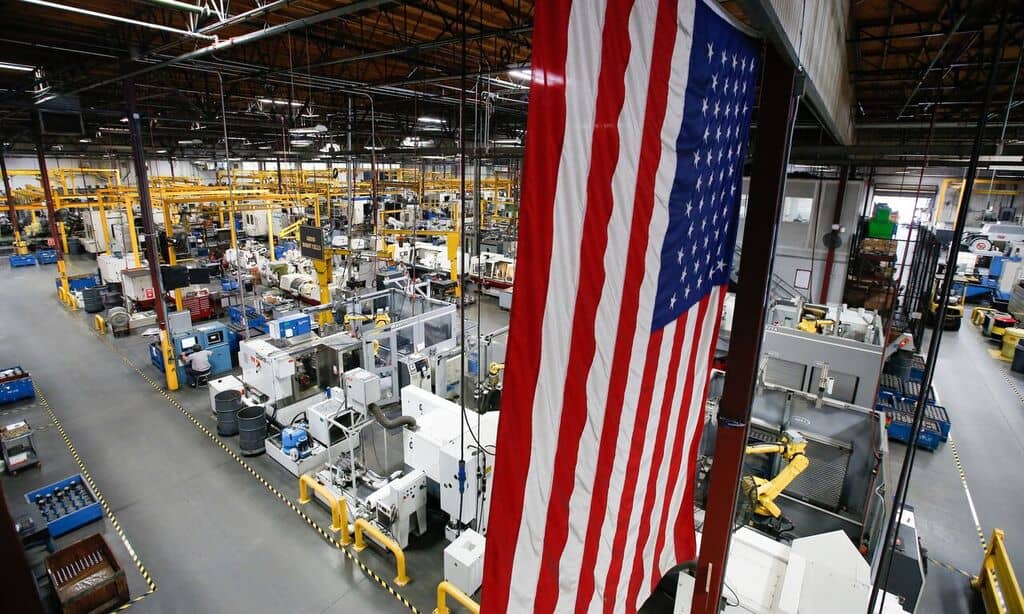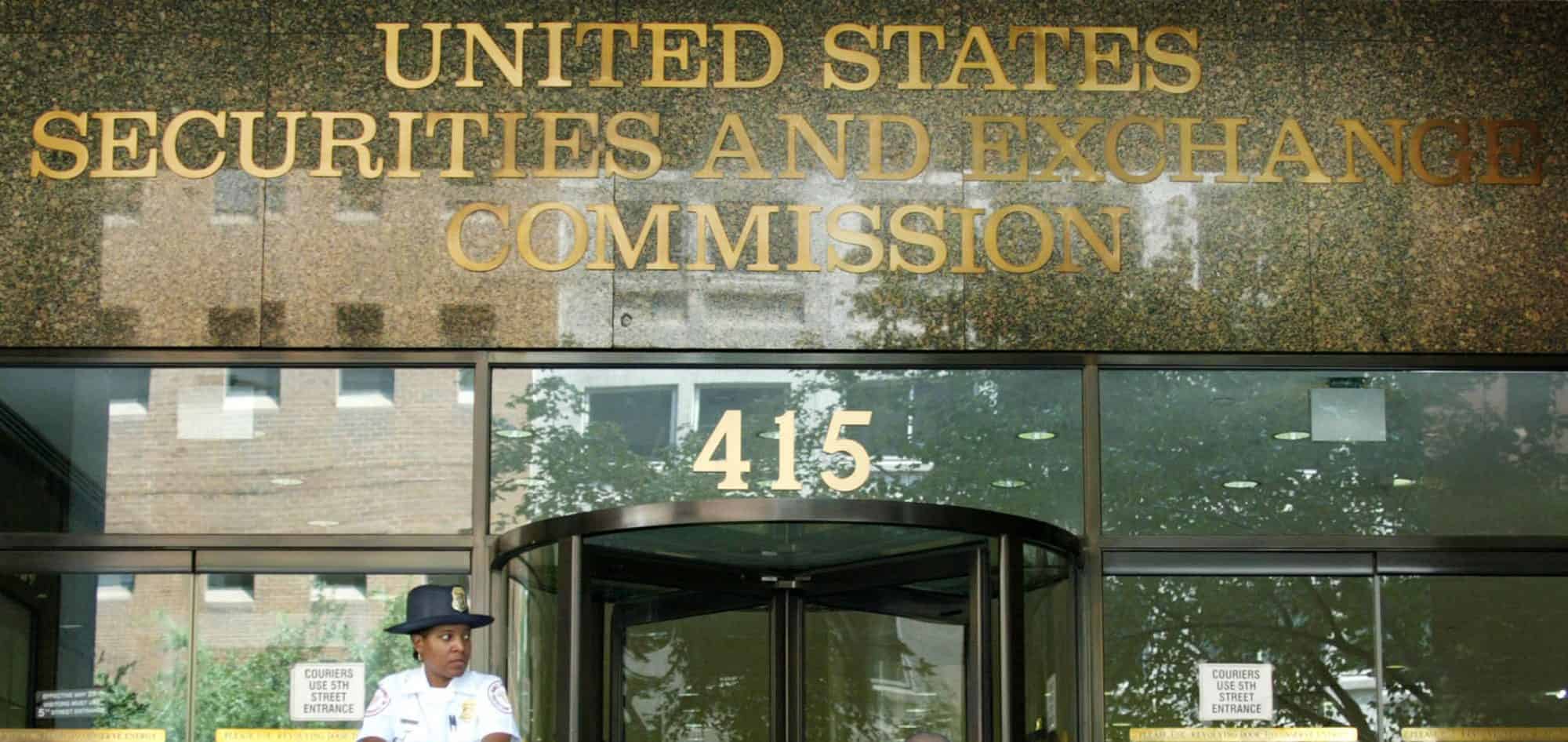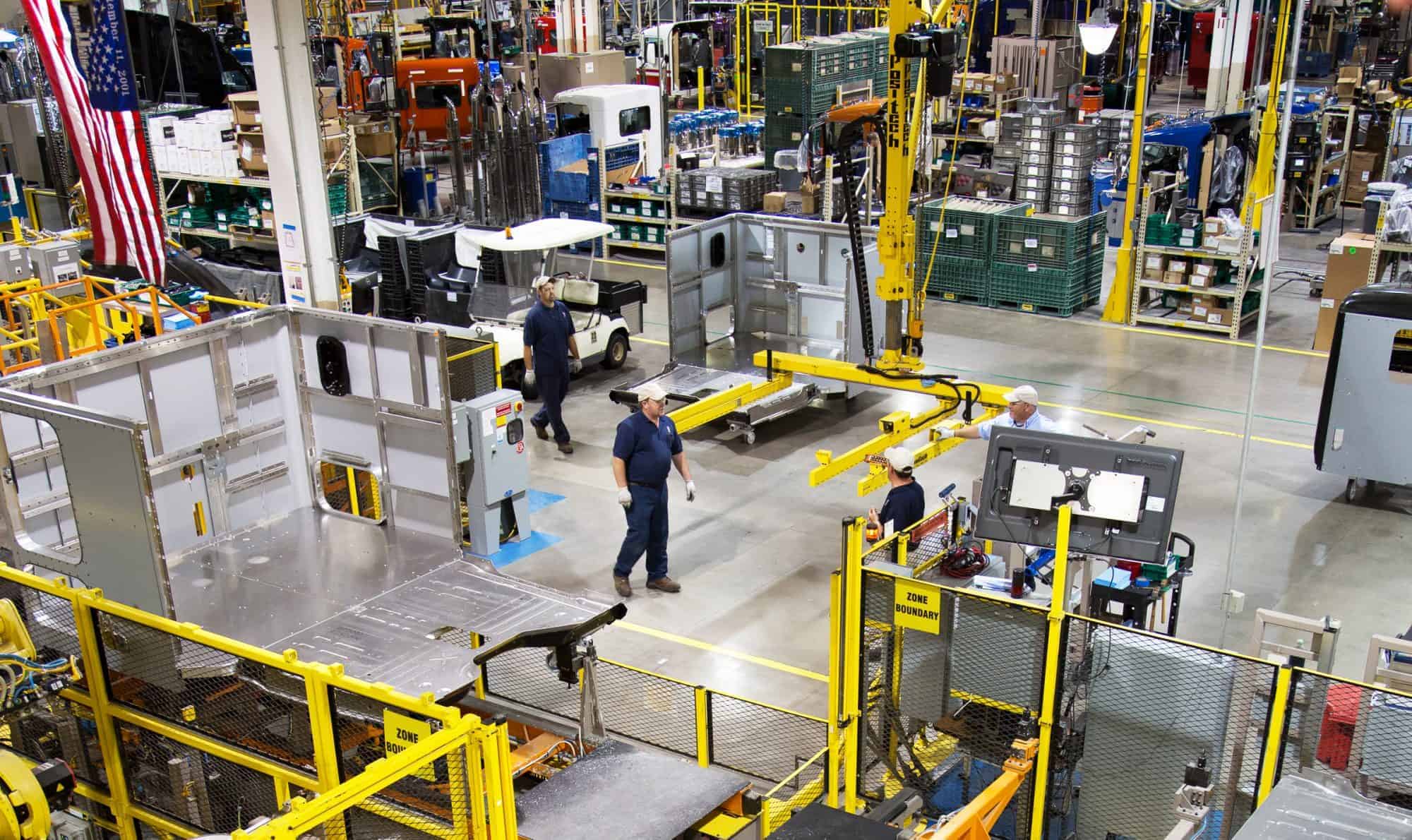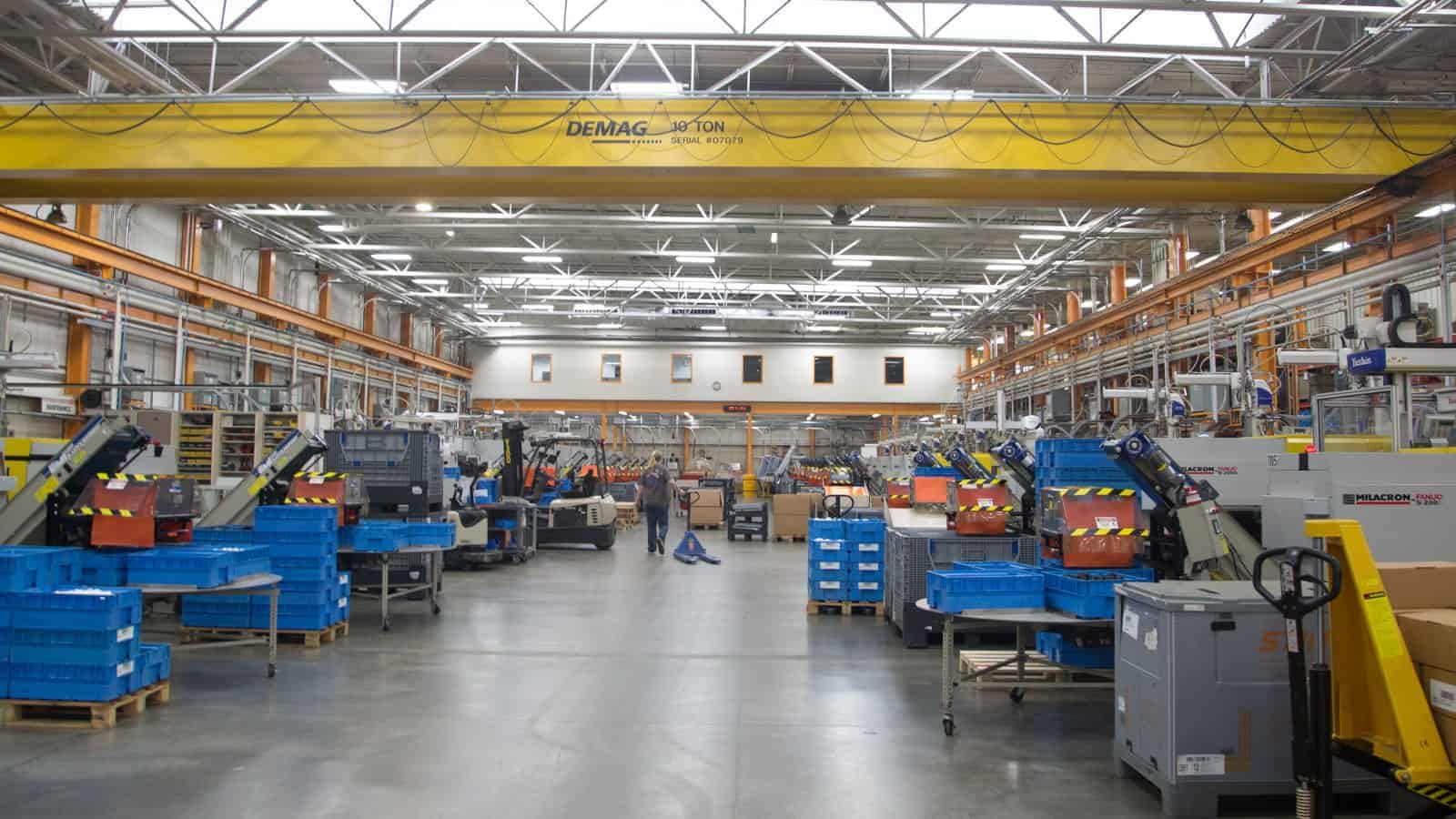Manufacturers Welcome SEC’s Proposed Proxy Rulemaking
Timmons: “The SEC Has Listened to Manufacturers’ Concerns”
Washington, D.C. – National Association of Manufacturers President and CEO Jay Timmons released the following statement on the Securities and Exchange Commission’s proposed proxy rulemaking:
Today’s announcement shows the SEC has listened to manufacturers’ concerns—and is taking action to rein in the abuses and risky practices of proxy advisory firms and politically motivated activists. Manufacturers across the country have called for reforms to help enhance our ability to grow and thrive in America. Proxy advisory firms are unregulated actors that put Main Street investors’ retirement savings at risk through their error- and conflict-ridden reports, while activists pressure manufacturers to focus on political issues at the expense of company growth. Reforming the proxy process will empower manufacturers to invest in our people and our communities more confidently—and to power economic growth for all Americans. The NAM looks forward to continuing to work with the SEC to finalize and implement this important rule proposal.
Background
The NAM has led the effort in favor of SEC action to ensure proxy advisory firms work in the best interest of manufacturers and manufacturing workers. Over the past two years, the NAM has written several comment letters to the SEC urging reforms to the proxy process, supported legislation passed by the House of Representatives to increase SEC oversight of proxy advisory firms and launched a six-figure ad campaign in conjunction with the U.S. Chamber of Commerce, including the website ProxyReforms.com, to highlight the issues that companies face in their interactions with proxy advisory firms and provide a feedback portal for businesses to share their stories.
-NAM-
The National Association of Manufacturers is the largest manufacturing association in the United States, representing small and large manufacturers in every industrial sector and in all 50 states. Manufacturing employs more than 12.8 million men and women, contributes $2.38 trillion to the U.S. economy annually, has the largest economic multiplier of any major sector and accounts for more than three-quarters of private-sector research and development. The NAM is the powerful voice of the manufacturing community and the leading advocate for a policy agenda that helps manufacturers compete in the global economy and create jobs across the United States. For more information about the Manufacturers or to follow us on Shopfloor, Twitter and Facebook, please visit www.nam.org.
Manufacturers Benefit From Trump’s Guidance Document Input Requirement

President Trump signed two executive orders this week that will require federal agencies to go through a process of public input when issuing major guidance documents, and will force agencies to make useful guidance documents more openly available for the public. That process of issuing notice and soliciting public input is similar to what agencies are required to follow when issuing regulations.
“This is serious, real regulatory reform and the NAM has lobbied for changes like these for years,” the National Association of Manufacturers’ Vice President of Labor, Legal and Regulatory Policy Patrick Hedren said. “These two new executive orders make the world of agency guidance more transparent, and they give manufacturers a seat at the table when agencies begin to draft new guidance documents.”
Representing a federal agency’s current thinking on a topic, guidance documents can be issued faster than regulations and previously did not require a notice and comment period. While these documents are not meant to be legally binding, they often are the basis for regulatory enforcement decisions, and manufacturers tend to view them as binding from a practical perspective. The White House said guidance documents should be subject to the same level of public scrutiny because they can be just as impactful as regulations.
“Agency guidance is often crucial to help manufactures understand complex regulations and statutes,” Hedren said. “But at the same time this sub-regulatory ‘dark matter’ can create chaos for heavily regulated industries like ours when agencies try to use the guidance process to end-run important rulemaking protections like notice and comment.”
Since the executive orders go into effect immediately, agencies will now implement their responses to the orders.
A version of this news article appeared in The Input, the NAM’s members-only weekday morning newsletter for manufacturing executives.
NAM Statement on D.C. Circuit Ruling in Mozilla Corp. v. FCC
“Manufacturers Support an Open Internet, as Does Today’s FCC”
Washington, D.C. – National Association of Manufacturers Senior Vice President and General Counsel Linda Kelly issued the following statement on today’s D.C. Circuit Court of Appeals ruling in Mozilla Corp. v. FCC:
Overall, today’s decision is a welcome development for manufacturers and those who depend on a free and open internet. In the 21st century, the internet should not be regulated by laws designed in the 1930s for the era of rotary telephones. The FCC was wrong to impose heavy-handed ‘net neutrality’ rules in 2015, and manufacturers have opposed misguided lawsuits that want to take us backward and reimpose those stifling regulations.
Manufacturers support a free and open internet, as does today’s FCC. More appeals and legal wrangling over the issue will only harm our competitiveness and economic growth, and the Manufacturers’ Center for Legal Action will keep fighting in the courts as long as it takes. Ultimately, the clearest way to resolve this issue is for Congress to pass basic guidelines that promote investment, foster innovation and establish a truly open internet.
Background
The NAM filed an amicus brief in the U.S. Court of Appeals for the D.C. Circuit supporting the FCC’s 2017 repeal of the prior net neutrality rule. Last year, a group of plaintiffs sued alleging the FCC unlawfully overturned the 2015 rule by mischaracterizing how internet access works. Manufacturers are the beneficiaries of a global broadband infrastructure, which has transformed the way they operate, providing numerous opportunities to create and market innovative products and services. The NAM’s brief explains that regulating broadband providers as common carriers is unwise, and the FCC’s 2017 change promotes investment that is critical to developing the next generation of technologies.
-NAM-
The National Association of Manufacturers is the largest manufacturing association in the United States, representing small and large manufacturers in every industrial sector and in all 50 states. Manufacturing employs more than 12.8 million men and women, contributes $2.38 trillion to the U.S. economy annually, has the largest economic multiplier of any major sector and accounts for more than three-quarters of private-sector research and development. The NAM is the powerful voice of the manufacturing community and the leading advocate for a policy agenda that helps manufacturers compete in the global economy and create jobs across the United States. For more information about the Manufacturers or to follow us on Shopfloor, Twitter and Facebook, please visit www.nam.org.
Universal Postal Union Changes Deliver Win for Manufacturers

This week, the Trump administration successfully negotiated changes to the Universal Postal Union (UPU) that will protect manufacturers from counterfeiters and other bad actors who have been exploiting the international system. The improvements were agreed upon at a special UPU conference in Geneva after two days of negotiations.
The UPU is an agency of the United Nations that coordinates the worldwide postal system and postal policies among member nations. In recent years, Chinese counterfeiters have exploited the system, which allowed them to ship packages to the United States at highly subsidized rates.
The Trump administration gave notice in October of last year that the United States would pull out of the UPU unless the body implemented significant structural reforms to the “terminal dues” system under which postal operators exchange mail, arguing that some countries’ postal carriers are not paying enough to have their shipments delivered to recipients in the United States.
Some countries in the UPU, such as China, pay lower rates because they were classified as “developing countries” when the terms of the UPU were originally agreed to. The terminal dues system and classifications have not changed in decades, while some of those countries have grown into major global economies.
Under the negotiated changes, countries with high-volume imports of mail and packages will be able to impose “self-declared rates” for distributing foreign mail. The agreement goes into effect in January 2021, but the United States may immediately begin to set payment rates that cover the true cost of carrying inbound international mail. In addition, UPU countries won a significant increase in the rates they can charge inbound mail from China as a way of reducing the total global subsidy China receives under the prior framework.
“With the changes negotiated this week, the U.S. can feel comfortable continuing its membership in the UPU and fighting for further reforms from inside the system while at the same time protecting manufacturers from counterfeiters overseas,” NAM Vice President of Labor, Legal and Regulatory Policy Patrick Hedren said. “These changes level the playing field for manufacturers against counterfeiting and other unfair trading practices. The administration gave manufacturers a true seat at the table, and we look forward to working with them and our international partners to continue promoting a fair and open trading economy.”
NAM Applauds Improvements to Universal Postal Union
Timmons: “This Is an Important Action to Level the Playing Field”
Washington, D.C. – National Association of Manufacturers President and CEO Jay Timmons released the following statement on the Trump administration’s successful negotiations to improve the Universal Postal Union:
Manufacturers are cheering today because we now have a stronger Universal Postal Union framework that will help protect manufacturers from counterfeiters and other bad actors operating in countries like China, which have been exploiting a dangerous and unfair system. The Trump administration gave manufacturers a seat at the table and listened to our needs throughout this collaborative process, and the United States worked with our allies abroad to bring broadly supported reforms to an antiquated agreement. This is an important action to level the playing field against unfair trading practices, and the NAM will continue to work with the administration and our international partners to promote a more open and fair trading economy.
-NAM-
The National Association of Manufacturers is the largest manufacturing association in the United States, representing small and large manufacturers in every industrial sector and in all 50 states. Manufacturing employs more than 12.8 million men and women, contributes $2.38 trillion to the U.S. economy annually, has the largest economic multiplier of any major sector and accounts for more than three-quarters of private-sector research and development. The NAM is the powerful voice of the manufacturing community and the leading advocate for a policy agenda that helps manufacturers compete in the global economy and create jobs across the United States. For more information about the Manufacturers or to follow us on Shopfloor, Twitter and Facebook, please visit www.nam.org.
EPA Administrator Wheeler Announces WOTUS Repeal Rule at NAM
Action Follows Advocacy by Manufacturers to Protect Water, Provide Certainty
Washington, D.C. – Environmental Protection Agency Administrator Andrew Wheeler and Assistant Secretary of the Army for Civil Works R.D. James joined National Association of Manufacturers President and CEO Jay Timmons at NAM headquarters to announce the finalization of a rule to repeal the controversial 2015 Waters of the United States rule and clear the way for a new rule to protect America’s water resources without overstepping the bounds of the law. Manufacturers sought this action from the EPA and for decades have advocated for clear rules to protect clean water and provide long-term certainty for economic growth.
Today, EPA and the Department of the Army finalized a rule to repeal the previous administration’s overreach in the federal regulation of U.S. waters and recodify the longstanding and familiar regulatory text that previously existed, said Administrator Wheeler. Today’s Step 1 action fulfills a key promise of President Trump and sets the stage for Step 2—a new WOTUS definition that will provide greater regulatory certainty for farmers, landowners, homebuilders and developers nationwide.
America is now one step closer to smart and balanced regulation that protects our nation’s precious water resources, said Timmons. Courts already declared the 2015 rule illegal, following years of litigation that included a 9-0 victory for the NAM at the Supreme Court, so manufacturers are pleased to see it officially struck from the books. The old water rule, which sought to regulate dry land, was confusing and counterproductive. Manufacturers are committed to environmental stewardship, so now we look forward to a new, more effective rule to protect clean water.
-NAM-
The National Association of Manufacturers is the largest manufacturing association in the United States, representing small and large manufacturers in every industrial sector and in all 50 states. Manufacturing employs more than 12.8 million men and women, contributes $2.38 trillion to the U.S. economy annually, has the largest economic multiplier of any major sector and accounts for more than three-quarters of private-sector research and development. The NAM is the powerful voice of the manufacturing community and the leading advocate for a policy agenda that helps manufacturers compete in the global economy and create jobs across the United States. For more information about the Manufacturers or to follow us on Shopfloor, Twitter and Facebook, please visit www.nam.org
Manufacturers Score Victory in SEC Oversight of Proxy Firms

Manufacturers won a victory yesterday as the Securities and Exchange Commission (SEC) published new guidance regarding proxy advisory firms, outlining how institutional investors should monitor their use and setting the stage for more effective oversight of the proxy firm business.
Investment advisers and fund managers who oversee Americans’ retirement savings are empowered to have a voice in the policies of the companies in which the fund invests. These fund managers often turn for assistance to proxy firms to recommend votes on company policies. As a result, proxy advisory firms have enormous influence over the corporate governance policies of U.S. public companies, impacting the direction of businesses they have no stake in and the life savings of Main Street investors. Unfortunately, a lack of oversight means proxy advisory firms can operate with undisclosed conflicts of interest and inadequate transparency, implement one-size-fits-all decision-making, and make errors that impose significant costs and damaging policies on manufacturers and workers.
The SEC’s guidance clarifies how investment advisers can utilize these firms, representing a significant step toward vital investor protections. In particular, the guidance outlines the due diligence that fund managers have to undertake when relying on a proxy firm’s services and identifies factors, such as errors, conflicts of interest, and methodological weaknesses, that fund managers should be on the lookout for.
“This decision is a big win for manufacturers across the country,” said Charles Crain, Director of Tax and Domestic Economic Policy at the National Association of Manufacturers. “With this guidance, the SEC is providing a roadmap for asset managers to protect Main Street investors’ best interests and laying the groundwork for improved oversight of the proxy advisory industry—and a smarter, more informed environment for millions of manufacturers and middle-class Americans.”
The SEC’s guidance echoes specific requests made by the NAM in their March 5 comment letter, in which the organization called for more clarity around “how investment advisers can utilize independent third parties in order to ensure that proxy voting decisions are made in the best interests of the middle-class Americans whose retirement accounts are at stake.”
The NAM has also requested additional rules that would implement direct SEC oversight of proxy advisory firms. The SEC yesterday issued interpretive guidance that its proxy rules do apply to firms providing proxy advice, and manufacturers are optimistic that further reforms will be considered and addressed by the SEC in the coming months.
“This SEC announcement represents critical direction for investment advisers and demonstrates the SEC’s understanding of the fiduciary duty these money managers owe to Americans nationwide,” said Crain. “We’re thankful that yesterday’s guidance provides critical guardrails manufacturers have called for, and we look forward to continuing this conversation to ensure that proxy voting decisions are made in the best interests of Americans saving for a secure retirement.”
NAM Welcomes SEC Guidance as Major Win for Manufacturers
“The SEC Has Heeded Manufacturers’ Call”
Washington, D.C. – National Association of Manufacturers President and CEO Jay Timmons released the following statement on the SEC’s announced guidance on proxy advisory firms:
“The SEC has heeded manufacturers’ call and has taken concrete steps that will help protect the savings of Main Street investors. For too long, investment advisers have relied on unaccountable proxy advisory firms when making decisions about Americans’ retirement investments. Proxy firms often have agendas disconnected from companies’ success or Americans’ financial security, and their reports have been found to contain errors and conflicts of interest. That’s why the NAM urged the SEC to act, and manufacturers are encouraged that the commission has heard our recommendations and is working to implement these initial reforms. We look forward to building on these first steps to achieve even more progress.”
Background
The NAM has been a leading voice in favor of SEC action to ensure proxy advisory firms work in the best interest of manufacturers and manufacturing workers. Over the past two years, the NAM has written several comment letters to the SEC urging reforms to the proxy process, supported legislation passed by the House to increase SEC oversight of proxy advisory firms and launched a six-figure ad campaign in conjunction with the U.S. Chamber of Commerce, including the website ProxyReforms.com, to highlight the issues that companies face in their interactions with proxy firms and provide a feedback portal for businesses to share their stories.
-NAM-
The National Association of Manufacturers is the largest manufacturing association in the United States, representing small and large manufacturers in every industrial sector and in all 50 states. Manufacturing employs more than 12.8 million men and women, contributes $2.38 trillion to the U.S. economy annually, has the largest economic multiplier of any major sector and accounts for more than three-quarters of private-sector research and development. The NAM is the powerful voice of the manufacturing community and the leading advocate for a policy agenda that helps manufacturers compete in the global economy and create jobs across the United States. For more information about the Manufacturers or to follow us on Shopfloor, Twitter and Facebook, please visit www.nam.org.
Wheeler Announces Proposed 401 Rule at NAM’s CMA Conference
“This Proposal Is a Win for Manufacturers”
Charleston, SC – National Association of Manufacturers President and CEO Jay Timmons released the following statement after EPA Administrator Andrew Wheeler announced an EPA proposal to clarify Section 401 of the Clean Water Act at the NAM’s Council of Manufacturing Associations’ Summer Leadership Conference in Charleston, South Carolina:
“The EPA’s efforts to modernize regulations and deliver regulatory certainty have contributed to strong manufacturing growth in recent years. This proposal is a win for manufacturers that would build on that success by offering much-needed clarity to states and manufacturers alike. Too often, the vaguely worded Section 401 has been used as an excuse to block critical infrastructure and trade projects. By setting clear guidelines, the EPA is empowering manufacturers to invest in our people and communities with confidence and to work with state leaders to protect our water and environment.
“We are grateful that Administrator Wheeler chose to announce this landmark proposal at the NAM’s Council of Manufacturing Associations’ Summer Leadership Conference. It demonstrates that by working together, government and business leaders can ensure economic growth and environmental stewardship go hand-in-hand.”
Section 401 of the Clean Water Act gives states an important role to play in ensuring water quality standards are not impaired by federally permitted projects. This proposal will give state and federal partners more clearly defined roles, responsibilities and consistent expectations in line with the statute and recent court decisions. The proposed rule seeks to protect waters by strengthening the Section 401 process.
-NAM-
The National Association of Manufacturers is the largest manufacturing association in the United States, representing small and large manufacturers in every industrial sector and in all 50 states. Manufacturing employs more than 12.8 million men and women, contributes $2.38 trillion to the U.S. economy annually, has the largest economic multiplier of any major sector and accounts for more than three-quarters of private-sector research and development. The NAM is the powerful voice of the manufacturing community and the leading advocate for a policy agenda that helps manufacturers compete in the global economy and create jobs across the United States. For more information about the Manufacturers or to follow us on Shopfloor, Twitter and Facebook, please visit www.nam.org.
733 10th St. NW, Suite 700 • Washington, DC 20001 • (202) 637-3000
Counterfeit Goods Harm Manufacturers and Consumers

When almost anything can be ordered online, how do you know if the product you’re buying is legitimate? Counterfeit goods are increasingly prevalent, and third-party e-commerce sites are making it easier than ever for counterfeiters to distribute inauthentic products.
To help combat this, the National Association of Manufacturers submitted comments last week to the Department of Commerce, proposing solutions to this counterfeit goods problem that is detrimental to manufacturers and customers alike. These comments reflect the rising tide of counterfeit products available, from auto parts to toys, from medicines to electronics and more.
These sales don’t just hurt businesses or inconvenience customers. Fake products can be a health and safety hazard. For example, prescription drugs are commonly counterfeited—with potentially severe consequences.
“First and foremost, we are always concerned about patient safety and the harmful effects that illegitimate products have,” Eli Lilly Director of Global Public Policy Tim McGuire said. “There is significant risk associated with putting medications in your body that haven’t gone through the rigorous regulatory review and approval processes that include safety testing and quality inspections.”
Even if a manufacturer is aware that counterfeit products are being distributed, getting those products removed from websites and working to communicate to customers that they have purchased fake goods is no small task. The process of identifying counterfeit sellers requires constant monitoring of search engines, e-commerce sites and other methods of distribution, and the onus is on the maker rather than the retailer.
“The big challenge is that counterfeiters always come back, and there isn’t a good structure in place to permanently prevent them from operating,” said Whirlpool Corp. Legal Counsel Nathan Davis. “You take down a listing, they put up a new listing. You shut down one website, they launch another website. The existing consequences are not sufficient to stop them.”
And for small- and medium-sized companies, the resources needed to stop the sale of counterfeit products can be prohibitive. Napoleon gas grills are an example: Accessories to go with these are often counterfeited and marketed as acceptable for use with Napoleon’s products. Consumers then think the counterfeit product is covered by Napoleon’s warranty.
“We’re essentially underwriting counterfeit products,” Napoleon Technical Support Manager Dana Moroz said. “The credibility of our brand name is affected, and we end up having to warrant inferior products to sustain our name. To the consumer, it’s all a Napoleon product.”
The NAM’s public comments provide next steps for combating counterfeiting, including recommendations for the U.S. government, for brand owners, and for online marketplaces and websites.
“Winning the fight against counterfeiters requires everybody—not just manufacturers, but e-commerce platforms and search engines, customs agents and consumer safety advocates—to get serious,” said NAM Director of International Business Policy Ryan Ong. “Stopping the flow of these products means not just legal and policy changes, but smarter enforcement priorities, better coordination and information sharing and a serious commitment by all parties to do their part.”
